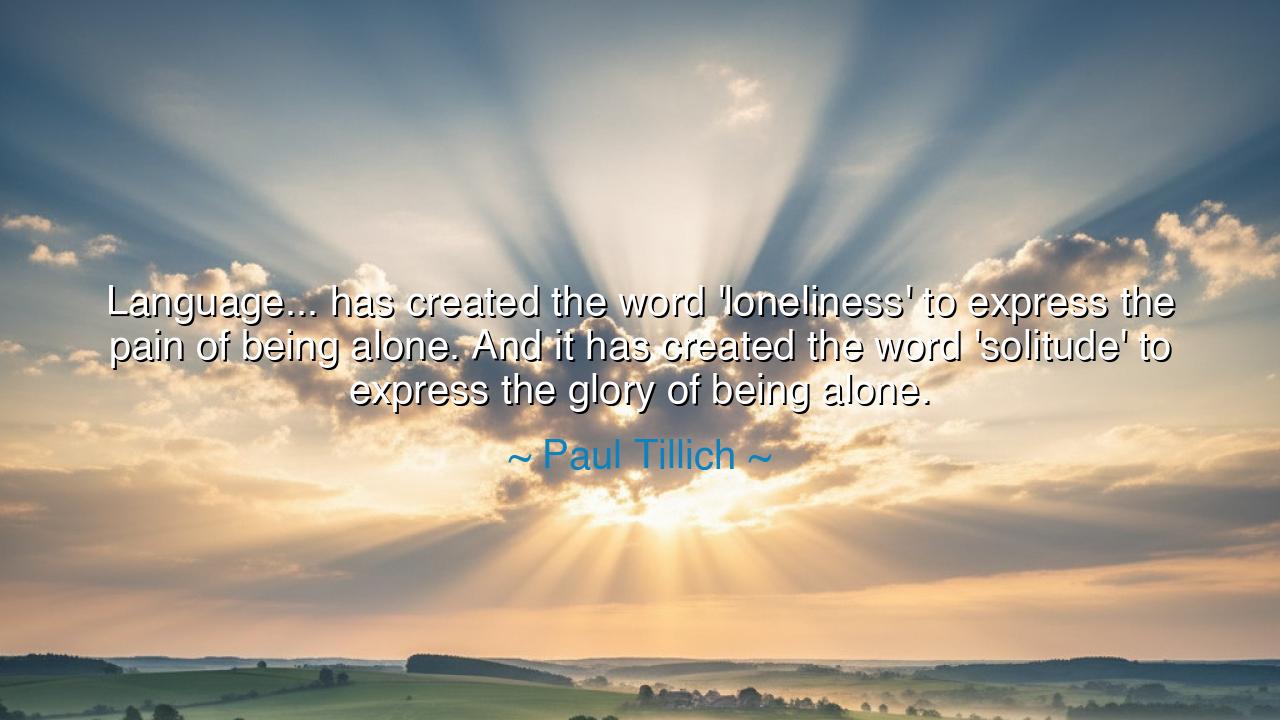
Language... has created the word 'loneliness' to express the pain
Language... has created the word 'loneliness' to express the pain of being alone. And it has created the word 'solitude' to express the glory of being alone.






Paul Tillich offers a profound reflection on the dual nature of being alone when he says, "Language... has created the word 'loneliness' to express the pain of being alone. And it has created the word 'solitude' to express the glory of being alone." In these words, Tillich uncovers the complex emotional landscape of isolation. For while loneliness is often associated with suffering, solitude can be a pathway to peace, clarity, and personal growth. Both words describe the same state—being alone—but they carry vastly different emotional weights. One evokes sorrow, the other, wisdom. This distinction invites us to reconsider how we view solitude and how we might transform what we perceive as loneliness into a sacred space for reflection and renewal.
In ancient times, the wisdom of the Stoics offers a deep understanding of solitude. Epictetus, the great Stoic philosopher, wrote that freedom comes from within, not from external circumstances. He believed that solitude was essential for cultivating virtue, as it allowed the philosopher to turn inward, free from the distractions and judgments of the world. For the Stoics, solitude was not a form of escape but a tool for developing self-mastery. Seneca, another Stoic thinker, echoed this sentiment, saying that "We suffer more often in imagination than in reality." This teaches us that solitude, when embraced with intention, becomes a space for self-empowerment, not suffering.
Consider the life of Socrates, who spent countless hours alone in thought and reflection. While his colleagues were often wrapped up in the bustle of public life, Socrates retreated inward, seeking knowledge and wisdom that was only accessible through solitude. He did not view being alone as a source of pain but as an opportunity to engage with the most profound questions of existence. In his solitude, he found the clarity and strength to guide others toward truth. Socrates’ example shows that solitude can serve as a fertile ground for growth, where the mind is freed from the noise of the world and can engage in deep, transformative thought.
On the other hand, loneliness, as Tillich suggests, can be a much darker experience. Consider the life of Vincent van Gogh, whose extraordinary artistic genius was accompanied by deep emotional struggles. Though surrounded by a few close friends, including his brother Theo, van Gogh often felt profoundly isolated. His loneliness was not simply the absence of people but the feeling of being disconnected from those around him. The pain of loneliness was so intense that it drove him to mental collapse and, ultimately, his tragic death. His story reminds us that loneliness, when coupled with a sense of alienation, can become a form of inner suffering that prevents us from connecting with others and ourselves.
Yet, solitude can provide a different kind of power. Mahatma Gandhi, in his pursuit of non-violence and self-reliance, often sought moments of solitude for deep reflection and spiritual growth. Though surrounded by followers and engaged in a revolution of monumental importance, Gandhi knew that it was in his moments of solitude—whether in prayer or fasting—that he found the strength to lead his people. Solitude was not an escape for Gandhi; it was a return to his inner self, where he could reflect on his ideals and connect deeply with his purpose. His solitude became a source of immense strength, guiding him to make decisions that would change the world.
The lesson Tillich imparts is one that urges us to reconsider our relationship with being alone. Instead of fearing loneliness as a sign of failure or emptiness, we should recognize that solitude—a conscious decision to embrace aloneness—can be the path to true wisdom and personal growth. It is through solitude that we are able to turn inward, free from the distractions of the world, to find the truth of who we are and what we stand for. In solitude, we are forced to confront ourselves, and it is this very confrontation that can lead to clarity, strength, and lasting peace.
Thus, I urge you, dear reader, to cultivate moments of solitude in your life, not as a retreat from the world, but as a powerful tool for self-discovery and personal growth. Use this time to reflect, to engage deeply with your thoughts, and to reconnect with your purpose. Solitude does not need to lead to loneliness; instead, it can be an opportunity to embrace your own company, to find your center, and to emerge stronger and more aligned with your true path. By doing so, you will transform moments of isolation into profound opportunities for growth, creating a deeper connection with both yourself and the world around you.






AAdministratorAdministrator
Welcome, honored guests. Please leave a comment, we will respond soon